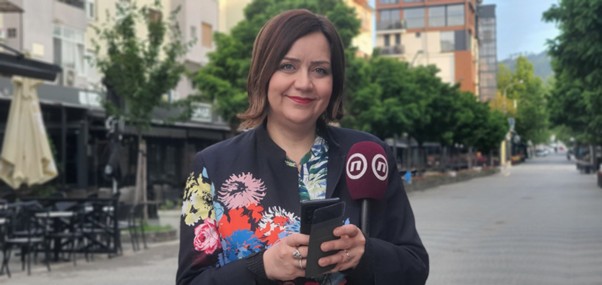If you asked the charshiya – Turkish word referring to the local milieu or social elite—what the ideal profession for a woman in Sandzak, in southwestern Serbia, should be, the answer would likely be: teacher, nurse, or a public-sector employee (in the municipality, a state office, and so on). In other words: a stable job, with all remaining time spent at home with the children. And that, more or less, sums up the expectations for a woman’s role and behavior in this part of the country.
Although Sandzak does offer examples of women’s emancipation, they still appear far less frequently as politicians, managers, or decision-makers. In the media, they are most often portrayed as humanitarian workers or as part of the cultural and education sectors.
Women in positions of authority or public office remain uncommon. Still, despite the frequent gender stereotypes in local media—which often depict women primarily as mothers, wives, and guardians of tradition—the number of stories highlighting successful Sandzak women, especially in business, science, or social activism, is steadily growing.
This is a conversation with one such woman. Young, successful, and—what is particularly rare—very well known in Sandzak. Her profession made her so: she is a journalist with regional TV Novi Pazar and a correspondent for TV Nova S.
“I am sure that in patriarchal environments it isn’t easy for women to work in journalism, but they are strong and capable. They know how to balance their other responsibilities with a profession that is pure love and a desire for a better world, both here and everywhere else”, says Katarina Radović from Novi Pazar.
Cheerful and almost always smiling, with large blue eyes, she has won over viewers with her calm, confident reporting, which we see nearly every day. Although she works without expecting praise, she admits that what she enjoys most is when both younger and older residents stop her in the street to compliment her or “get information straight from the source”.
“Being a journalist in Novi Pazar is both wonderful and challenging. I first worked in media in Belgrade, then came to Novi Pazar, and I’ve now been here for 15 years. All respect to my male colleagues, but it’s women journalists who have truly brought recognition to Novi Pazar. For me, it feels normal to be a journalist in patriarchal and traditional Novi Pazar. Sometimes it’s not easy for men, but they respect it and have gotten used to women journalists. And it seems to me they fear questions from women journalists more than from men”, Katarina explains.

Sandzak is a multiethnic and culturally rich region, known for its blend of Oriental and Balkan heritage, the hospitality of its people, and a turbulent history that has shaped its diversity. Novi Pazar is home to the oldest mosque in Serbia (the Ahmed Bey Mosque) and one of the oldest Christian churches (the Church of St. Peter). In this area, Islamic, Orthodox, and Oriental traditions intertwine. In Novi Pazar, Sjenica, and Tutin, one hears a mix of languages, accents, and the melodies of the ezan and church bells. The čaršija—the heart of every Sandžak town—is not just a marketplace but a vibrant center of encounters, dialogue, and community life.
Women in Sandzak are increasingly making their voices heard on social media, becoming more present and visible in public life. The internet has opened broader opportunities for women’s education and professional development, and for young women in particular, it has become a platform for amplifying female voices.
“Even though we live in a modern era, the struggle against prejudice seems greater than ever. Through my work, I try to promote women leaders, entrepreneurs, and strong female figures who can serve as role models for many girls in Sandzak. Media literacy is essential today so people can recognize disinformation and fake news. Several times a year, I work with young people on debunking false information and learning together how to challenge prejudice”, Katarina explains.
Speaking about the more difficult sides of journalism, Katarina says that maintaining “positive thinking and a positive attitude toward the job” is crucial.
“I’m aware that I live and work in a multiethnic environment, and that this is a great advantage and a richness that I can use to report with even higher quality. No matter where I work, I work the same way—professionally, responsibly, and truthfully. That’s probably why both the authorities and the opposition, as well as those who are undecided, are always willing to talk to me”.
Katarina Radović was born in Novi Pazar, where she completed primary and secondary school. She earned her degree from the Faculty of Political Sciences in Belgrade, where she worked for nearly ten years at the weekly Vreme, the Beta news agency, RTV, Politika, Glas javnosti, as well as Studio B and Blic. Since 2010, she has worked in media in Novi Pazar and as a correspondent for the television network Nova S. She is also active in the nonprofit sector through her involvement with the civil society organization REPER.




